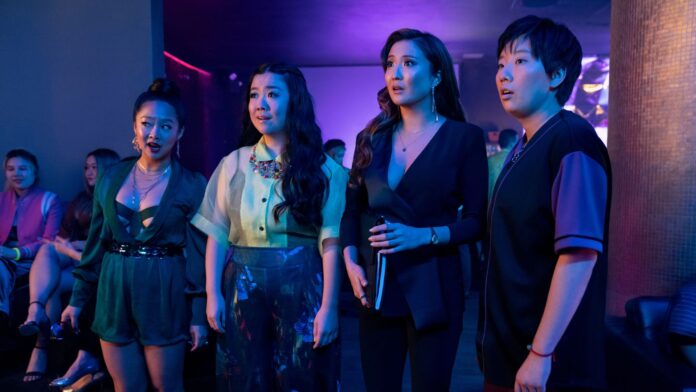Female friendship, self-worth and a sense of belonging are at the core of the raucous comedy, “Joy Ride,” opening July 7. This very funny — and very profane — film skewers Asian stereotypes and the model minority myth while it also promotes body positivity, as well as sex, drugs and K-pop.
Audrey (Ashley Park) is the adopted daughter of two white parents (Annie Mumolo and David Denman) and the childhood best friend of Lolo (bisexual actress/comedian Sherry Cola), in part because they are the only two Asian girls in the aptly named White Hills. As an adult, Audrey is a successful lawyer who will become a partner if she closes a big deal in China. So, Audrey and Lolo — a struggling artist who makes erotic pieces — fly back to their motherland with Lolo’s K-pop loving cousin, Deadeye (nonbinary actor Sabrina Wu). In China, Audrey also reconnects with her college roommate, Kat (Stephanie Hsu), a popular actress. During this business trip, Lolo encourages Audrey to seek out her birth mother, whom she never knew.
“Joy Ride” is a narrative of return for Audrey and a “grand adventure” for her friends, and the audience. Director Adele Lim, who co-wrote the film with Cherry Chevapravatdumrong and Teresa Hsiao, keeps the laughs coming in almost every scene as racism is called out and sex is a near constant topic of discussion. Lolo, in particular is uninhibited, searching for sex with men or women. In contrast, Kat is being chaste; she is engaged to her co-star Clarence (Desmond Chiam of “With Love”). Kat’s fiancé is unaware of her past sexual history, and Kat wants to keep it that way. However, Audrey and Lolo are aware of that history, as well as the tattoo on Kat’s genitalia, a topic that is mentioned — and asked not to be mentioned — before it delivers an uproarious payoff later in the film.
There are many hilarious moments throughout “Joy Ride,” such as one sequence where Audrey engages in a threesome, while Kat and Lolo are also both off having sex — or in Kat’s case, trying not to. Meanwhile, Deadeye performs dance moves with a fellow K-pop fan. As each character achieves an orgasm (or equivalent), the men all experience some form of pain. “Joy Ride” is that kind of female empowerment film, and that is why it succeeds so admirably.
That said, not all of the humor works. A sequence on a train where the friends encounter a drug dealer (Meredith Hagner) and must ingest — or otherwise hide in their bodies — large quantities of illegal substances is a bit strained. So too is a gag involving Kat trying to pass the drugs she concealed in her anal cavity. This sequence may be a way of showing that Asian women can be as crude as men, but that is not necessarily a theory that needed proving. It is certainly amusing when Audrey can’t hold her liquor, (cue two vomit gags) or when Lolo is demonstrating sex noises, but the film is best when it emphasizes belonging.
“Joy Ride” is about finding oneself through finding one’s people, a universal theme that gets a nice twist here. Audrey is more like her white American parents than her Asian heritage suggests, so her quest for her birth mother takes on a deeper meaning when she learns more about her birth family. Deadeye feels friendless, and yet she eventually bonds with Audrey and Kat. And while Kat and Lolo are frenemies at first — a slapping game they play is both funny and nasty — they too realize they have more in common beyond their love for Audrey.
The bonding generates one of the best sequences, where the four friends pretend to be a K-pop group so they can travel without passports, which were stolen during the drug escapade. Illustrated via colorful costumes, and a silly dance video with raunchy lyrics, this sequence is a pure delight until something unexpected happens that creates a series of comedic chain reactions.
Much of the film’s comedy goes for the extreme, and the characters may behave inappropriately, but the film never loses sight of its message about knowing where you come from and who you are. As each character grapples with decisions they have made, they learn what is truly important to them. There are a few nice touchy-feely moments in the film’s end that temper the outrageous antics.
The four leads are all well cast, with Cola the standout as the unfiltered Lolo. (The actress also steals every scene as a lesbian best friend in the forthcoming “Shortcomings” out August 4.) Cola’s sass and attitude is refreshing because Lolo is both a cheerleader for Audrey and her biggest defender. Lolo is also someone who can tell her best friend the truth even though she is not completely honest with herself. As Kat, Stephanie Hsu gives a broad and bawdy comic performance, delivering some of the film’s funniest moments. As the uptight Audrey, Park shines, especially in a scene when she meets a kind hearted stranger. As Deadeye, Wu’s deadpan humor seems underutilized, but Wu excels when they provide the comic relief, most notably when Deadeye plays a made-up card game with a young relative or during the K-pop video.
“Joy Ride” provides a memorable trip for both its characters and viewers. It may not traverse new territory, but it does feature a nice mix of heart and vulgar humor.
